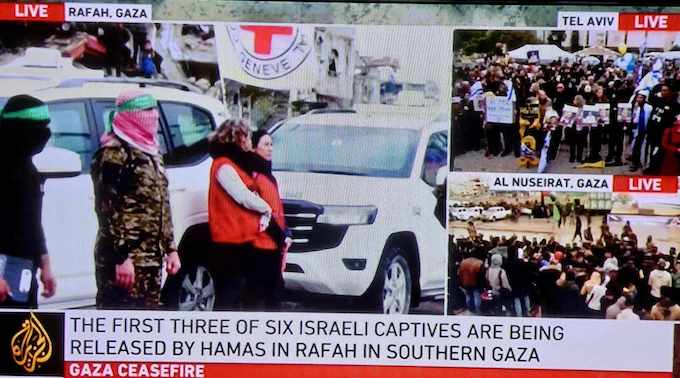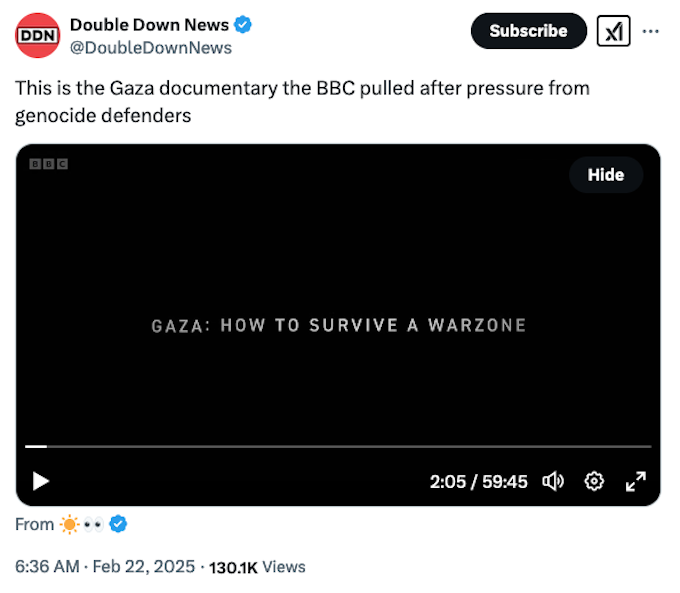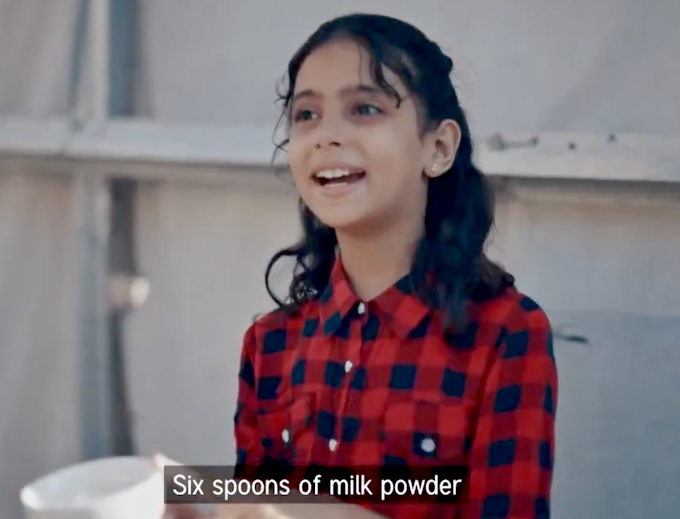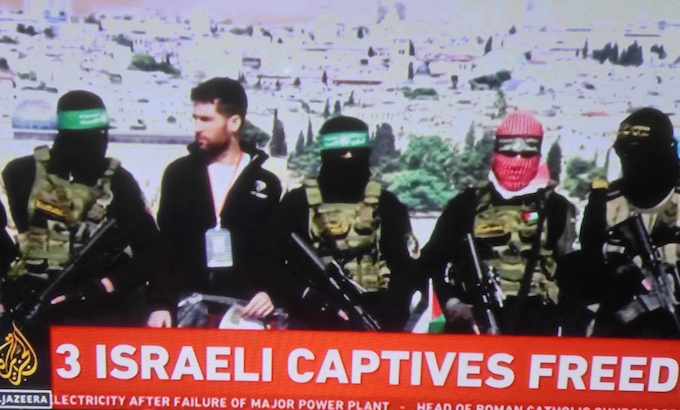DOCUMENTARY: Democracy Now!
The Palestinian-Israeli film No Other Land won an Oscar for best documentary feature at Sunday’s Academy Awards.
The film — recently screened in New Zealand at the Rialto and other cinemas — follows the struggles of Palestinians in the occupied West Bank community of Masafer Yatta to stay on their land amid home demolitions by the Israeli military and violent attacks by Jewish settlers aimed at expelling them.
The film was made by a team of Palestinian-Israeli filmmakers, including the Palestinian journalist Basel Adra, who lives in Masafer Yatta, and Israeli journalist Yuval Abraham, both of whom are prominently featured in the film.
AMY GOODMAN: And the Oscars were held Sunday evening. History was made in the best documentary category.
SAMUEL L. JACKSON: And the Oscar goes to ‘No Other Land’.
AMY GOODMAN: The Palestinian-Israeli film No Other Land won for best documentary. The film follows the struggles of Palestinians in the occupied West Bank community of Masafer Yatta to stay on their land amidst violent attacks by Israeli settlers aimed at expelling them. The film was made by a team of Palestinian-Israeli filmmakers, including the Palestinian journalist Basel Adra, who lives in Masafer Yatta, and the Israeli journalist Yuval Abraham.
Both filmmakers — Palestinian activist and journalist Basel Adra, who lives in Masafer Yatta, and Israeli journalist Yuval Abraham — spoke at the ceremony. Adra became the first Palestinian filmmaker to win an Oscar.
BASEL ADRA: Thank you to the Academy for the award. It’s such a big honor for the four of us and everybody who supported us for this documentary.
About two months ago, I became a father. And my hope to my daughter, that she will not have to live the same life I am living now, always fearing — always — always fearing settlers’ violence, home demolitions and forceful displacements that my community, Masafer Yatta, is living and facing every day under the Israeli occupation.
‘No Other Land’ reflects the harsh reality that we have been enduring for decades and still resist as we call on the world to take serious actions to stop the injustice and to stop the ethnic cleansing of Palestinian people.
YUVAL ABRAHAM: We made this — we made this film, Palestinians and Israelis, because together our voices are stronger.
We see each other — the atrocious destruction of Gaza and its people, which must end; the Israeli hostages brutally taken in the crime of October 7th, which must be freed.
When I look at Basel, I see my brother. But we are unequal. We live in a regime where I am free under civilian law and Basel is under military laws that destroy his life and he cannot control.
There is a different path: a political solution without ethnic supremacy, with national rights for both of our people. And I have to say, as I am here: The foreign policy in this country is helping to block this path.
And, you know, why? Can’t you see that we are intertwined, that my people can be truly safe if Basel’s people are truly free and safe? There is another way.
It’s not too late for life, for the living. There is no other way. Thank you.
Israeli and Palestinian documentary ‘No Other Land’ wins Oscar. Video: Democracy Now!
Transcript of the February 18 interview with the film makers before their Oscar success:
AMY GOODMAN: We turn now to the occupied West Bank, where Israel is reportedly planning to build nearly a thousand new settler homes in the Efrat settlement near Jerusalem. The Israeli settlements are illegal under international law.
The group Shalom Achshav, Peace Now, condemned the move, saying the Netanyahu government is trying “to establish facts on the ground that will destroy the chance for peace and compromise”.
This comes as Israel’s ongoing military operations in the West Bank have displaced at least 45,000 Palestinians — the most since the ’67 War.
Today, the Oscar-nominated Palestinian director Basel Adra shared video from the occupied West Bank of Israeli forces storming and demolishing four houses in Masafer Yatta.
Earlier this month, Basel Adra himself filmed armed and masked Israeli settlers attacking his community of Masafer Yatta. The settlers threw stones, smashed vehicles, slashed tires, punctured a water tank.
Israeli soldiers on the scene did not intervene to halt the crimes.
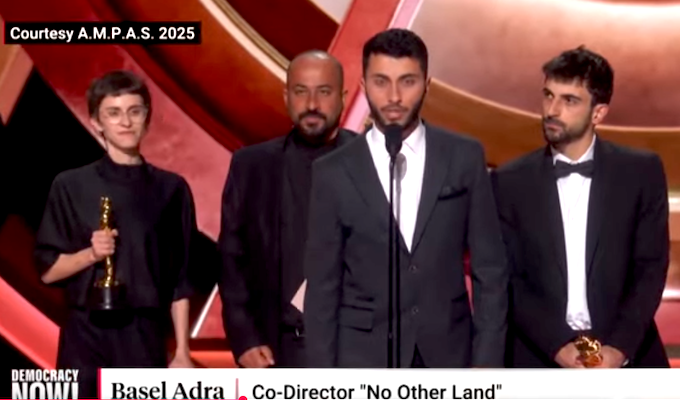
Basel Adra’s Oscar-nominated documentary No Other Land is about Israel’s mass expulsion of Palestinians living in Masafer Yatta.
In another post last week, Basel wrote: “Anyone who cared about No Other Land should care about what is actually happening on the ground: Today our water tanks, 9 homes and 3 ancient caves were destroyed. Masafer Yatta is disappearing in front of my eyes.
Only one name for these actions: ethnic cleansing,” he said.
In a minute, Basel Adra will join us for an update. But first, we want to play the trailer from his Oscar-nominated documentary, No Other Land.
No Other Land trailer. Video: Watermelon Films
BASEL ADRA: [translated] You think they’ll come to our home?
MASAFER YATTA RESIDENT 1: [translated] Is the army down there?
NEWS ANCHOR: A thousand Palestinians face one of the single biggest expulsion decisions since the Israeli occupation of the Palestinian territories began.
YUVAL ABRAHAM: [translated] Basel, come here! Come fast!
BASEL ADRA: [translated] This is a story about power.
My name is Basel. I grew up in a small community called Masafer Yatta. I started to film when we started to end.
They have bulldozers?
I’m filming you.
MASAFER YATTA RESIDENT 2: [translated] I need air. Oh my God!
MASAFER YATTA RESIDENT 3: [translated] Don’t worry.
MASAFER YATTA RESIDENT 2: [translated] I don’t want them to take our home.
YUVAL ABRAHAM: [translated] You’re Basel?
BASEL ADRA: [translated] Yes.
MASAFER YATTA RESIDENT 4: [translated] You are Palestinian?
YUVAL ABRAHAM: [translated] No, I’m Jewish.
MASAFER YATTA RESIDENT 5: [translated] He’s a journalist.
MASAFER YATTA RESIDENT 4: [translated] You’re Israeli?
MASAFER YATTA RESIDENT 5: [translated] Seriously?
BASEL ADRA: [translated] We have to raise our voices, not being silent as if — as if no human beings live here.
YUVAL ABRAHAM: [translated] What? The army is here?
BASEL ADRA: This is what’s happening in my village now. Soldiers are everywhere.
IDF SOLDIER: [translated] Who do you think you’re filming, you son of a whore?
YUVAL ABRAHAM: [translated] It would be so nice with stability one day. Then you’ll come visit me, not always me visiting you. Right?
BASEL ADRA: [translated] Maybe. What do you think? If you were in my place, what would you do?
AMY GOODMAN: That’s the trailer for the Oscar-nominated documentary No Other Land, co-directed by the Israeli journalist Yuval Abraham and our next guest, Basel Adra, Palestinian activist and journalist who writes for +972 Magazine, his most recent piece headlined “Our film is going to the Oscars. But here in Masafer Yatta, we’re still being erased.”
Basel has spent years documenting Israeli efforts to evict Palestinians living in his community, Masafer Yatta, south of Hebron.
Basel, welcome back to Democracy Now! If you can talk about your film and also what’s happening right now? This is not a film about history. It’s on the ground now. You recently were barricaded in your house filming what was going on, what the Israeli settlers were doing.
Palestinian film maker Basel Adra talks to Democracy Now! Video: Democracy Now!
BASEL ADRA: Thank you for having me.
Yeah, our movie, we worked on it for the last five years. We are four people — two Israelis and two Palestinians, me, myself, Yuval and Rachel and Hamdan, who’s my friend and living in Masafer Yatta. We’re just activists and journalists.
And me and my friend Hamdan spent years in the field, running after bulldozers, soldiers and settlers, and in our communities and communities around us, filming the destruction, the home destructions, the school destructions, the cutting of our water pipes and the bulldozing of our roads and our own schools, and trying to raise awareness from the international community on what’s going on, to get political impact to try to stop this from happening and to protect our community.
And five years ago, Yuval and Rachel joined, as Israeli journalists, to write about what’s happening. And then we decided together that we will start working on No Other Land as a documentary that showed the whole political story through personal, individual stories of people who lost their life and homes and school and properties on this, like in the last years and also in the decades of the occupation.
We released the movie in the Berlinale 2024, last year, at the festival. And so far, we’ve been, like, screening and showing, like, in many festivals around the world.
JUAN GONZÁLEZ: And, Basel, your film has received an Oscar nomination, but you haven’t been able to find a distributor in the US What do you know about this refusal of any company to pick up your film to distribute it? And also, can it be seen in the West Bank or in Israel itself?
BASEL ADRA: It’s sad that we haven’t found a US distributor. Our goal from making this documentary, it’s not the award. It’s not the awards itself, but the people and the audience and to get to the people’s hearts, because we want people to see the reality, to see what’s going on in my community, Masafer Yatta, but in all the West Bank, to the Palestinians and how the life, the daily life under this brutal occupation.
People should be aware of this, because they are — somehow, they have a responsibility. In the US, it’s the tax money that the people are paying there. It has something to do with the home destruction that we are facing, the settlers’ violence, the building of the settlements on our land that does not stop every day.
And we, as a collective, made this movie. We faced so many risks in the field, on the ground. Like, my home was invaded, and the cameras were confiscated from my home by Israeli soldiers.
I was physically attacked in the field when I’m going around and filming these crimes, I mean, to show to the people and to let the people know about what’s going on.
But it’s sad that the distributors in the US so far do not want to take a little bit of risk, political risk, and to show this documentary to the audience. I am really sad about it, that there is no big distributors taking No Other Land and showing it to the American people.
It’s very important to reach to the Americans, I believe. And so far, we are doing it independently on the cinemas.
JUAN GONZÁLEZ: And your co-director is Israeli. Have you come under criticism for working with Israelis on the film?
BASEL ADRA: So far, I’m not receiving any criticism for working with Israelis. Like, working together is because we share somehow the same values, that we reject the injustice and the occupation and the apartheid and what’s going on, and we want to work pro-solution and pro-justice and to end these, like, settlements and for a better future.
AMY GOODMAN: Basel, the Oscars are soon, in a few weeks. Can you get a visa to come into the United States? Will you attend the Oscars?
BASEL ADRA: So, I have a visa because I’ve been in the US participating in festivals for our movie. But my family and the other Palestinian co-director doesn’t have one yet, and they will try to apply soon.
And hopefully, they will get it, and they will be able to join us at the Oscars.
AMY GOODMAN: So, since it’s so difficult to see your film here in the United States, I want to go to another clip of No Other Land. Again, this is our guest, Basel Adra, and his co-director, Yuval Abraham, filming the eviction of a Palestinian family.
BASEL ADRA: [translated] A lot of army is here.
YUVAL ABRAHAM: [translated] They plan a big demolition?
BASEL ADRA: [translated] We don’t know. They’re driving towards one of my neighbors.
Now the soldiers arrived here.
MASAFER YATTA RESIDENT 1: [translated] Aren’t you ashamed to do this? Aren’t you afraid of God?
ISRAELI SOLDIER: [translated] Go back! Move back now! Get back! I’ll push you all the way back!
YUVAL ABRAHAM: [translated] I speak Hebrew. Don’t shout.
MASAFER YATTA RESIDENT 2: [translated] I hope that bulldozer falls on your head. Why are you taking our homes?
MASAFER YATTA RESIDENT 3: [translated] Why destroy the bathroom?
AMY GOODMAN: That’s Israeli bulldozers destroying a bathroom. This is another clip from No Other Land, in which you, Basel, are attacked by Israeli forces even as you try to show them you have media credentials.
BASEL ADRA: [translated] I’m filming you. I’m filming you! You’re just like criminals.
ISRAELI SOLDIER: [translated] If he gets closer, arrest him.
BASEL ADRA: [translated] You’re expelling us. Arrest me! On what grounds?
ISRAELI SOLDIER: [translated] Grab him.
BASEL ADRA: [translated] On what grounds? I have a journalist card. I have a journalist card!
ISRAELI SOLDIER: [translated] Shut up!
BASEL’S FATHER: [translated] Don’t hit my son! Leave our village! Go away! Leave, you [bleep]! Shoot.
ISRAELI SOLDIER: [translated] Move back.
BASEL’S FATHER: [translated] Shoot me. Shoot me. Shoot me.
BASEL’S MOTHER: [translated] Get an ambulance!
BASEL’S FATHER: [translated] Run, Basel! Run! Get up, son. Run! Run, Basel!
AMY GOODMAN: Basel, that is you. Your mother is hanging onto you as you’re being dragged, your father. What do you want the world to know about Masafer Yatta, about your community in this film?
BASEL ADRA: I want the world to really act seriously. The international community should take measures and act seriously to end this, like, demolitions and ethnic cleansing that is happening everywhere in Gaza, in the West Bank, through different policies and different, like, reasons that the Israelis try to separate out, which is all lies.
It’s all about land, that they want to steal more and more of our land. That’s very clear on the ground, because every Palestinian community being erased, there is settlements growing in the same place.
This is happening right there, in the South Hebron Hills, everywhere around the West Bank, in Area C. And now they are entering camps, since January until now, by demolishing, like, destroying the camps in Jenin, Tulkarm and Tubas, and forcing people to leave their homes, to go away.
And the world just keeps watching and not taking serious action. And the opposite, actually.
The Israelis keep receiving all. Like, this amount of violations of the international law, the human rights laws, it’s very clear that it’s violated every day by the Israelis. But nobody cares. The opposite, they keep receiving weapons and money and relationships and —
AMY GOODMAN: Basel —
BASEL ADRA: — and diplomatic cover. Yes.
AMY GOODMAN: We have to leave it there. I thank you so much, look forward to interviewing you and Yuval in the United States. Basel Adra, co-director of the Oscar-nominated documentary No Other Land.
The original content of this programme is licensed and republished by Asia Pacific Report under a Creative Commons Attribution-Noncommercial-No Derivative Works 3.0 United States Licence.
This content originally appeared on Asia Pacific Report and was authored by Pacific Media Watch.
This post was originally published on Radio Free.

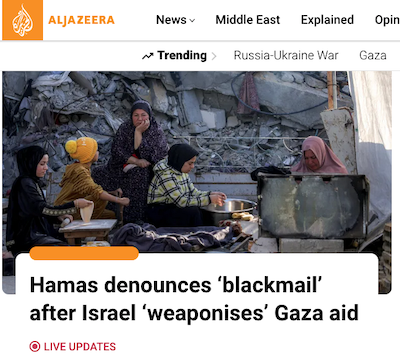
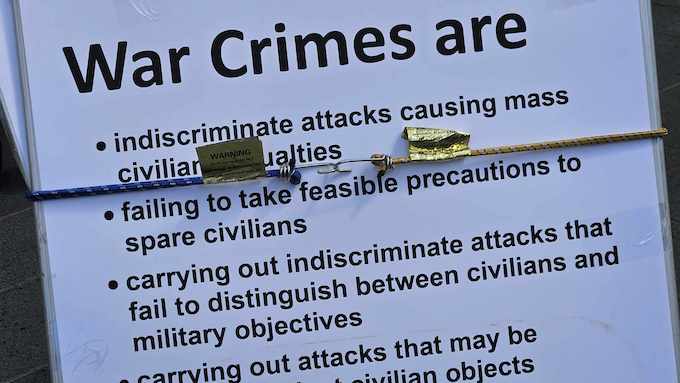
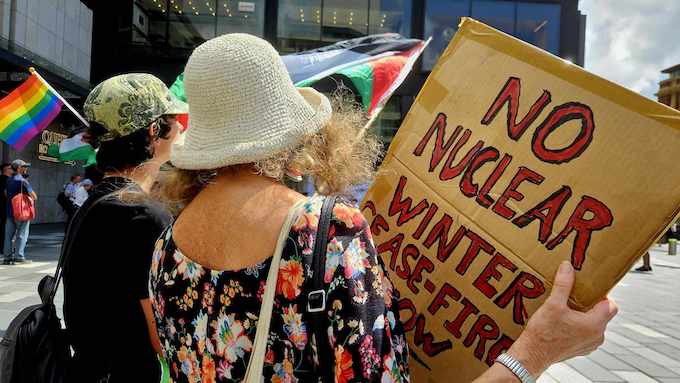
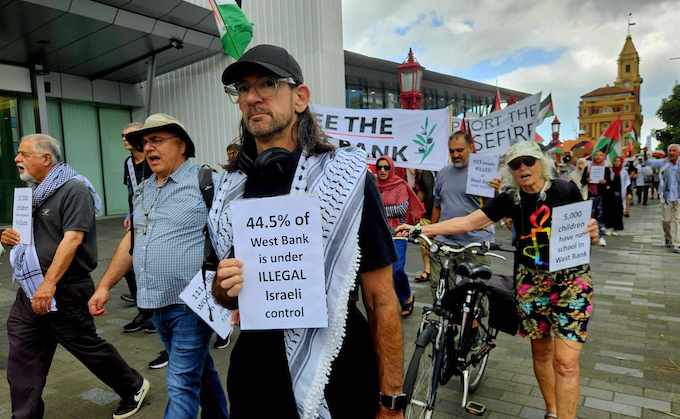
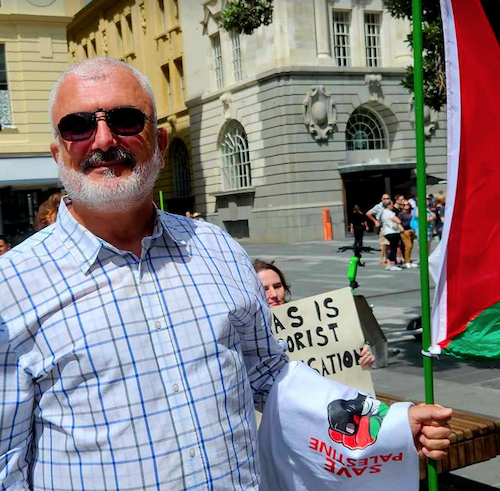
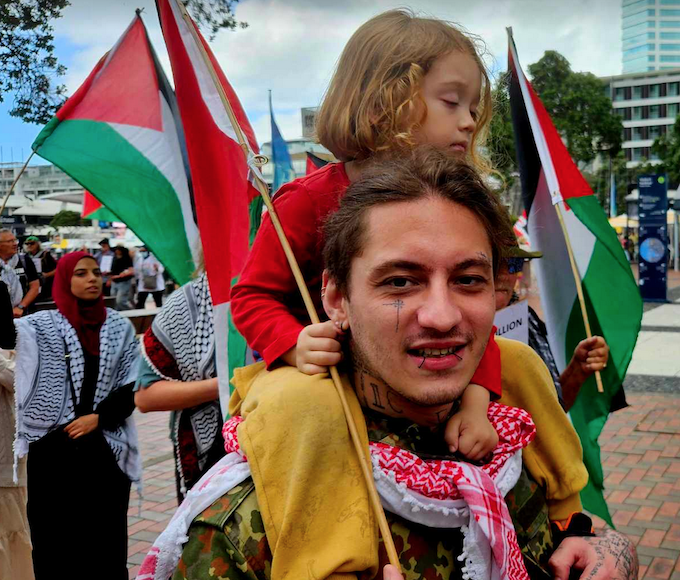
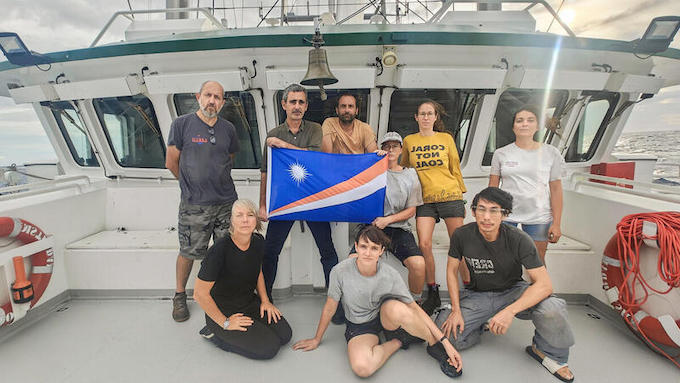
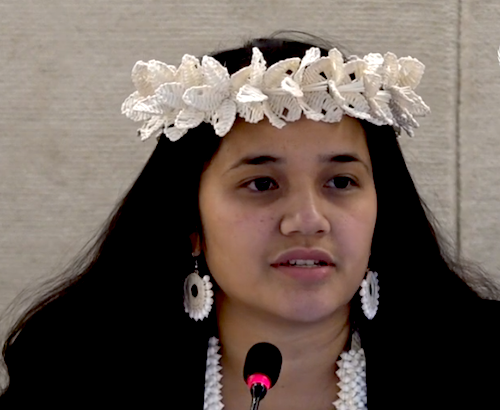
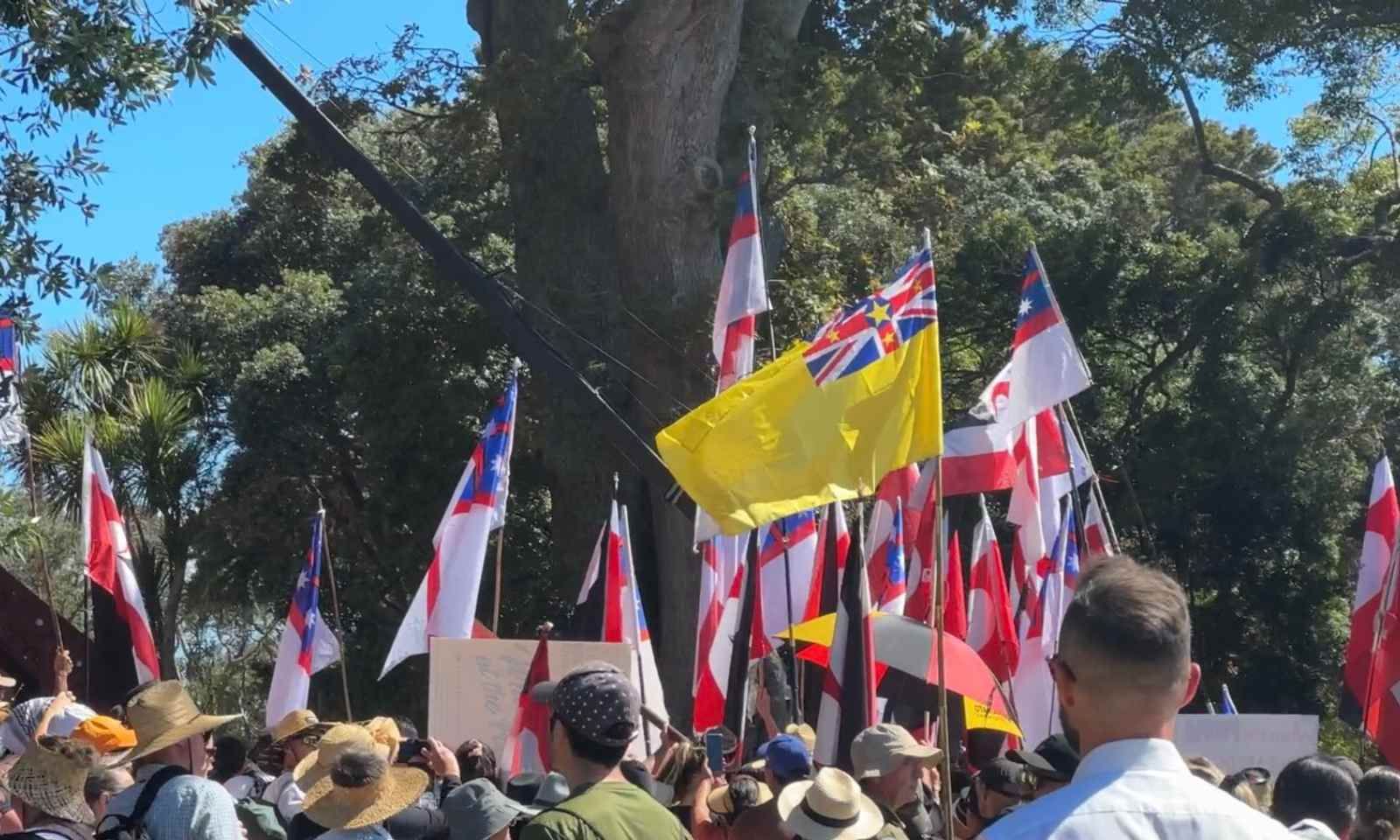
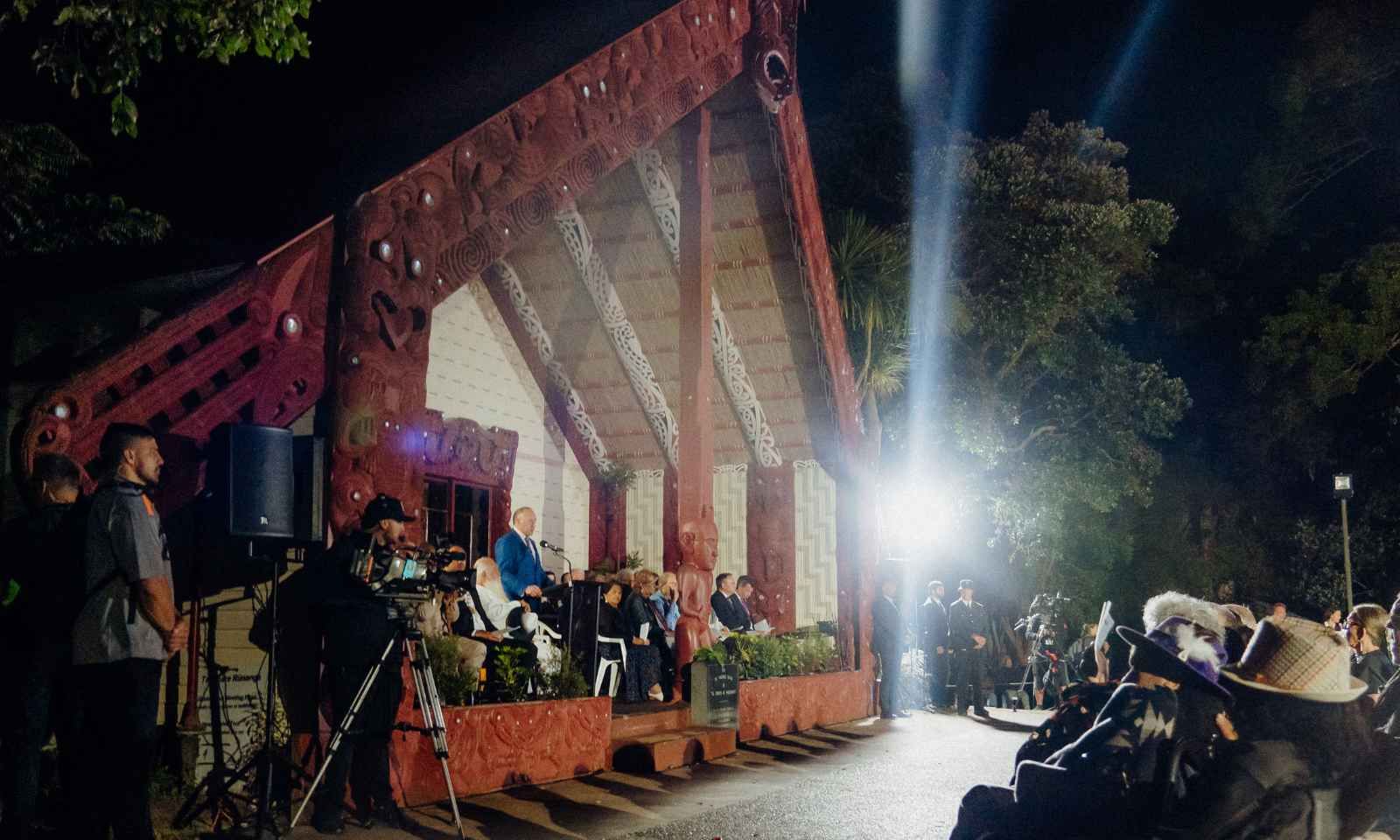

 Manuel Valls en Nouvelle-Calédonie : échange tendu entre le ministre des Outre-mer et des personnalités non-indépendantistes
Manuel Valls en Nouvelle-Calédonie : échange tendu entre le ministre des Outre-mer et des personnalités non-indépendantistes Nicolas Metzdorf et Sonia Backès lui reprochent certaines prises de position depuis la reprise des discussions
Nicolas Metzdorf et Sonia Backès lui reprochent certaines prises de position depuis la reprise des discussions

 LIVE updates
LIVE updates 
